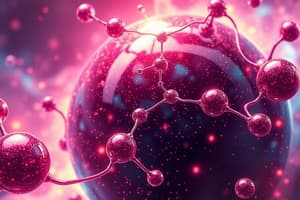Podcast
Questions and Answers
What element is the primary focus of organic chemistry?
What element is the primary focus of organic chemistry?
- Hydrogen
- Nitrogen
- Oxygen
- Carbon (correct)
Organic compounds are fundamentally different from inorganic compounds.
Organic compounds are fundamentally different from inorganic compounds.
False (B)
What are some examples of naturally occurring organic molecules?
What are some examples of naturally occurring organic molecules?
Cotton, wool, and silk
What is the main component of natural gas?
What is the main component of natural gas?
Ethanol is formed by the __________ of sugar.
Ethanol is formed by the __________ of sugar.
What determines the properties of an organic molecule?
What determines the properties of an organic molecule?
What was the life expectancy in 1900?
What was the life expectancy in 1900?
Which of these compounds is NOT an example of an organic compound?
Which of these compounds is NOT an example of an organic compound?
What is a valid Lewis structure used to show?
What is a valid Lewis structure used to show?
What factors does a functional group determine?
What factors does a functional group determine?
Flashcards are hidden until you start studying
Study Notes
Overview of Organic Chemistry
- Organic chemistry studies carbon-containing compounds, rooted in historical distinctions between organic (living) and inorganic (nonliving) substances.
- The term “organic” persists despite the understanding that it is an artificial classification.
- Organic compounds outnumber inorganic compounds substantially and are integral to everyday life.
- Common applications of organic chemicals include clothing, food, medicines, fuels, refrigerants, and soaps.
Impact of Organic Chemistry
- Significant advancements in life expectancy (from 47 years in 1900 to over 70 today) largely attributed to drug synthesis, vaccines, and pest control methods.
- Organic chemistry contributes to agricultural productivity through fertilizers, pesticides, and herbicides, ensuring food availability.
Representative Organic Molecules
- Methane: Simplest organic compound, with one carbon atom; main component of natural gas; produces energy through combustion; formed naturally from organic decomposition.
- Ethanol: Found in alcoholic beverages; produced by sugar fermentation, representing an ancient method of organic synthesis; lab-produced ethanol is identical to fermented ethanol.
Course Insights
- Organic chemistry involves the study of a vast range of molecules, from simple (methane, ethanol) to complex (capsaicin, ginkgolide B).
- Understanding organic molecules includes grasping their properties, structures, and reactions.
Importance of Lewis Structures
- Lewis structures visually represent atoms, bonds, and lone pairs, crucial for identifying molecular properties.
- Each hydrogen in a valid structure has two electrons; second-row elements adhere to the octet rule (maximum of eight electrons).
Geometry and Hybridization
- The arrangement of groups around an atom informs its geometry and hybridization, key concepts in molecular structure.
Drawing Organic Molecules
- Shorthand methods are utilized for efficiently representing organic molecule structures, facilitating learning and communication.
Functional Groups
- Functional groups are critical as they define:
- Bonding and molecular shape
- Intermolecular forces (type and strength)
- Physical properties of compounds
- Nomenclature and functional reactivity
Studying That Suits You
Use AI to generate personalized quizzes and flashcards to suit your learning preferences.




